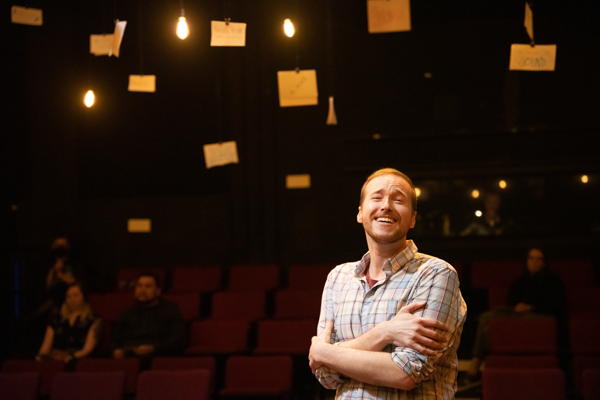
NJT’s 'Every Brilliant Thing' is a love letter to the human spirit
By Bryn McLaughlin
“It’s important to talk about things— particularly things that are hardest to talk about.”
Upon entering New Jewish’s intimate black box theater, audiences are presented with three things:
- A simple set consisting of an armchair, vinyl record player, and a large area rug.
- A sea of lightbulbs and papers dangling from the ceiling.
- A warm welcome from actor Will Bonfiglio, who is greeting every audience member individually with a big smile. He is handing out colored cards that each have a number on them.
With these three elements, director Ellie Schwetye invites audiences to both be curious, and to be ready to play. The numbered cards that each audience member receives are not quirky giveaways, but pieces of a road map that will move the evening forward.
The plot of playwright Duncan Macmillan and Jonny Donahoe’s script is simple: An unnamed Narrator (played by Bonfiglio) shares his journey from childhood to adulthood, working through the hard aftermath of being exposed to his mother’s attempted suicide at a very young age. As a child, our Narrator developed a simple way to find joy in the face of hardship: he created a list of every brilliant thing he could think of, from “the color yellow” to “riding a bike downhill”, to remind himself of the wonder of life. As he grows up, in times of need, he revisits the list and adds to it.
While the subjects of depression and suicide are heavy, Macmillan and Donahoe’s script explores them with a unique performance element that brings a much-needed lightness to the conversation. Throughout the course of the show, the Narrator calls numbers, at which point the audience member holding the corresponding card will read out what is typed on their paper: one of the many “brilliant things” from the Narrator’s list. As the story of the Narrator’s life unfolds, he also selects audience members to play out short, guided scenes. In doing so, the crowd slowly becomes part of his story, and provides support to him through his most difficult times by reminding him of the things that make life worth living.
Will Bonfiglio seems perfectly in his element in this one-man show. He bubbles with positivity and is quick to give encouraging words to his impromptu scene partners. While some theatregoers may balk at the idea of having a spotlight shined on them, Bonfiglio does an excellent job of making the interactions fun and unintimidating. This type of improvisational crowd work can be extremely difficult, but Bonfiglio makes it look like a joy.
A play as personal as this one is a perfect fit for the J’s intimate black box. The three-quarter round staging not only provides a sizeable playground for Bonfiglio (who spends just as much time walking through the audience as he does on the stage), but also creates a sense of “togetherness” for the viewers, as it is so easy to see and hear other crowd members. The sparseness of the stage was a smart choice from designer Bess Moynihan—The hanging papers and lightbulbs above give a nod to childhood whimsy, but on the ground level, the Narrator is at all times the most exciting thing to look at.
There are a few inevitable drawbacks to producing a play that requires so much audience participation. No matter how inviting the atmosphere is, the knowledge that you may be called on at any moment may still be nerve wracking to some audience members (or at the very least, mildly distracting), which could make it difficult to fully engage with the story itself.
There is also a high likelihood of small hiccups, such as a confused participant mishearing their number and shouting at the incorrect moment. The fun in these little flubs, though, is then seeing how Bonfiglio nimbly redirects the situation—always resulting in a laugh. "Mistakes" bring the audience closer together.
Theatre is at its best when it reminds audiences that it is capable of reaching out in ways that television and cell phone screens cannot, and that they cannot predict its next move. Schwetye’s direction of this play ticks both of these boxes—this is a living, breathing theatrical experience that will be uniquely realized in each performance.
While the show allows for moments of sorrow, it does not wallow or indulge, but prioritizes hope. New Jewish Theater’s “Every Brilliant Thing” is an artfully crafted love letter—to the human spirit in all its resilience, to finding lights in the darkest of places, and to the potential mightiness of seemingly innocuous things.
Performances of “Every Brilliant Thing” continue through April 2 at the SFC Performing Arts Center, 2 Millstone Campus Drive. More information is available at the New Jewish Theatre web site.


